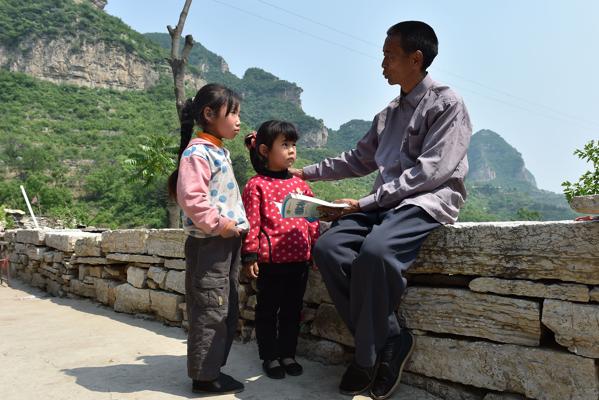
A teacher instructs students to recite poems at a village in Pingshun, Shanxi province, in May.[Photo/Xinhua]
China will increase the number and quality of teachers in rural areas in the next five years, according to a State Council plan released on June 8.
The measures include forming multiple channels to select teachers for rural areas, improving the living standards of the teachers, helping them to get more training and setting up a reward system for them, according to the five-year plan.
Xu Tao, director of the Education Ministry’s Teacher Education Department, said the plan has the crucial aim of promoting education equality among different regions.
“By raising the number and quality of teachers working in rural and impoverished areas, we hope to narrow the gap in educational resources so that children in underdeveloped areas can have as good an education as their peers in developed areas,” Xu said.
The Party and the State Council, China’s Cabinet, have made nurturing high-quality teachers for rural areas a priority.
During his visit to Beijing Normal University last year, President Xi Jinping said western and rural areas are being shortchanged in education, and efforts must be made to change that situation.
According to the plan, a system will be set up to grant material rewards to teachers who have worked in rural areas for one to three decades.
Village teachers will receive a lot of training, especially on teachers’ ethics, as well as on the application of information, communication and technology in daily teaching.
The plan also promised to improve the living standards of village teachers by offering them stipends, comprehensive social insurance and even dormitories or apartments.
To expand the sources of village teachers, Xu said, the ministry will encourage universities across the country to nurture students as candidates.
“As a reward, candidates who finally become village teachers can earn their college tuition fees back after working for a couple of years,” he said.
The ministry will also encourage excellent retired teachers from urban areas, with measures such as financial incentives, to give lectures and lessons in rural and impoverished areas, Xu added.
Some provinces and regions, such as Guangdong, have already started taking action in this direction.
Luo Weiqi, director of the Guangdong provincial Education Department, said the tuition-refunding policy had attracted more than 40,000 college students to work as teachers for preschools and primary and middle schools in the province’s underdeveloped areas.
“I believe that with the implementation of the five-year plan, more professional and high-quality teachers will join the efforts to create a better education for children in rural areas,” Luo said.
However, Chu Zhaohui, a senior researcher with the National Institute of Education Sciences, said increasing the number and improving the quality of village teachers is just the starting point to promote quality and equality in Chinese education.
“There are still lots of things to be done after that to ensure that children from urban and rural areas enjoy the same education resources and services,” he said.
